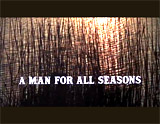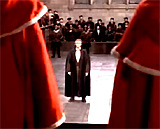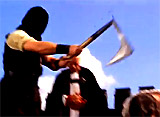
|
A Man For All Seasons (1966,
UK)
In Fred Zinnemann's Best Picture-winning film of Richard
Bolt's adaptation of his own play:
- the main plot: the continuing strength and courage
of Lord Chancellor Sir Thomas More (Oscar-winning Paul Scofield)
- after King Henry VIII (Robert Shaw) declared himself the Supreme
Head of the Church of England; More, a devout Catholic, refused
on principle to sign the Act of Succession and would not take the
Oath of Supremacy that would grant permission to the King to divorce
his own elder brother Arthur's widow - his barren wife Catherine
of Aragon; Henry was intent on having a wife bear a male heir to
continue his dynastic reign, so he set his sights on marrying mistress
Anne Boleyn (Vanessa Redgrave)
- the "Give the Devil Benefit of Law" scene
- More's reverential defense of the law toward brilliant lawyer William
Roper (Corin Redgrave), a Lutheran, who had designs to marry his
daughter Margaret "Meg"
(Susannah York); during a heated discussion, Roper asked: "Now
you give the Devil benefit of law!" - More artfully responded: "Yes.
What would you do? Cut a great road through the law to get after the
Devil?" - when Roper replied: "Yes. I'd cut down every law
in England to do that," More responded forcefully: ("Oh,
and when the last law was down, and the Devil turned on you, where
would you hide, Roper, the laws all being flat? This country is planted
thick with laws from coast to coast, man's laws, not God's, and if
you cut them down, and you're just the man to do it, do you really
think you could stand upright in the winds that would blow then? Yes.
I give the Devil benefit of law for my own safety's sake")
- determined to break from Rome, King Henry renounced
papal authority - and demanded that bishops and Parliament renounce
all allegiance to the Pope; he declared himself the head of the Anglican
Church, known as the Act of Supremacy - hence, he annuled his current
marriage and wed Anne (who was then crowned as Queen in 1533); the
new Archbishop of Canterbury (Cyril Luckham) upheld the marriage
- Thomas Cromwell (Leo McKern) in Parliament passed
a law requiring all English subjects to take an oath of allegiance
to accept Henry's will, but More refused to accept the heresy and
publically endorse Henry - and was imprisoned for a year in the Tower
of London for being a traitor
- the scene of More's trumped-up, fallacy-filled court
trial that included the treachery of courtier Richard Rich (John
Hurt) when he perjured himself to destroy More; More denied the accusations
of Rich: ("In good faith, Rich, I am sorrier for your perjury
than my peril"), and then asserted: ("You know if I were
a man who heeded not the taking of an oath, I need not be here. Now,
I will take an oath. If what Master Rich has said is true, I pray
I may never see God in the face. Which I would not say were it otherwise,
for anything on earth!"); then he stated that Rich's testimony,
and his refusal to modify his own testimony, doomed him: ("I
am a dead man. You have your will of me")
- in the short following sequence as Rich was about
to leave the court, More noticed a golden pendant around Rich's neck:
("That's a chain of office you're wearing...The Red Dragon")
- obviously a bribery reward - Rich had recently been appointed as
the new Attorney General for Wales; More noted to Rich: ("Why
Richard, it profits a man nothing to give his soul for the whole
world. But for Wales"); without a jury or deliberations (a sham
trial), More was quickly found guilty and pronounced "guilty
of high treason"
- during his last words when he was finally able to
speak, More passionately defended his actions and chastised his former
friend and King, for committing an illegal action - he cited the
Biblical basis for the authority of the Papacy over Christendom,
and stated that the Church was immune to the state's interference
- guaranteed in both the Magna Carta and in the King's own Coronation
Oath: ("Since the Court has determined to condemn me, God knoweth
how, I will now discharge my mind concerning the indictment and the
King's title. The indictment is grounded in an act of Parliament
which is directly repugnant to the law of God and His Holy Church.
The supreme government of which no temperable person may by any law
presume to take upon him. This was granted by the mouth of our Saviour,
Christ Himself, to St. Peter and the bishops of Rome whilst He lived
and was personally present here on earth. It is therefore insufficient
in law to charge any Christian to obey it. And more than this, the
immunity of the Church is promised both in Magna Carta and in the
King's own Coronation Oath"); he then went on, vowing his allegiance
to the King, but still disapproving of the marriage: ("I am
the King's true subject and I pray for him and all the realm. I do
none harm. I say none harm. I think none harm. And if this be not
enough to keep a man alive then in good faith, I long not to live.
Nevertheless, it is not for the supremacy that you have sought my
blood, but because I would not bend to the marriage!")
- the concluding scene of More's beheading execution
at the Tower of London and his brief poignant words: ("I am
commanded by the King to be brief and since I am the King's obedient
subject, brief I will be. I die His Majesty's good servant, but God's
first"); then he spoke directly to his executioner (Eric Mason)
after giving him a coin for his duty, and forgave him: ("I forgive
you, right readily. Be not afraid of your office. You send me to
God")
- the epilogue voice-over of the narrator (voice of
Colin Blakely), about the aftermath and how More became a revered
martyr: ("Thomas More's head was stuck on Traitors' Gate for
a month. Then his daughter, Margaret, removed it and kept it 'til
her death. Cromwell was beheaded for high treason five years after
More. The Archbishop was burned at the stake. The Duke of Norfolk
should have been executed for high treason, but the King died of
syphilis the night before. Richard Rich became Chancellor of England
and died in his bed")
|

King Henry VIII (Robert Shaw)

Sir Thomas More (Paul Scofield) Defending the Law to William
Roper


Treachery of Richard Rich Perjuring Himself -
for the Reward of Being Appointed Attorney General of Wales

More's Defense of His Actions

Pronounced Guilty of High Treason - Final Thoughts

Beheading Execution at Tower of London
|








